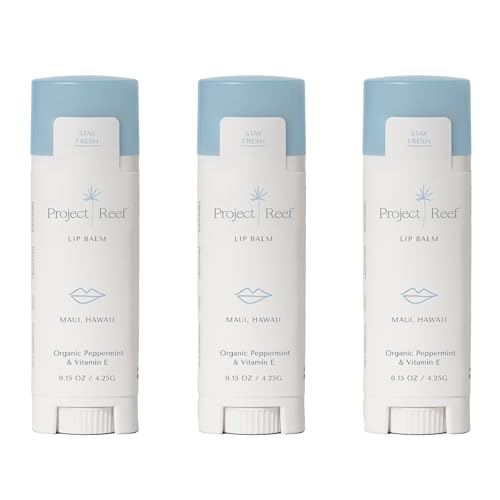
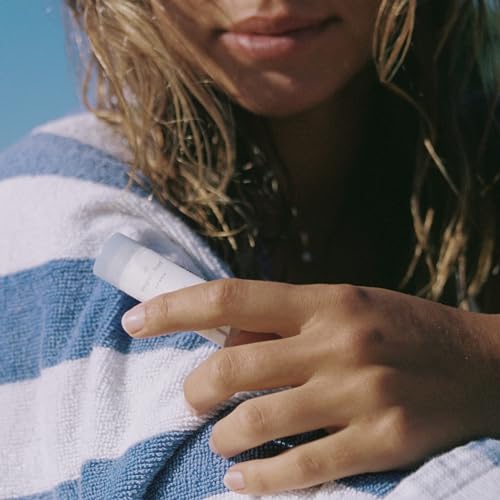

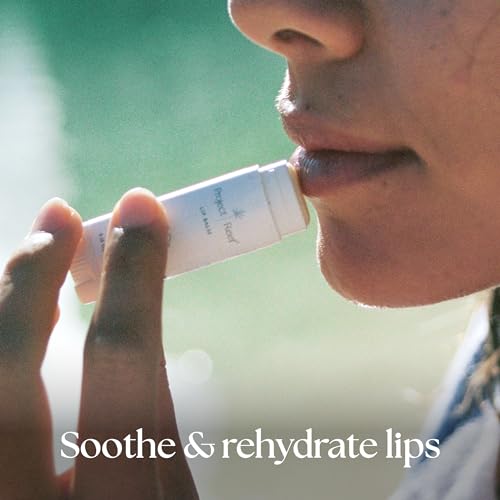
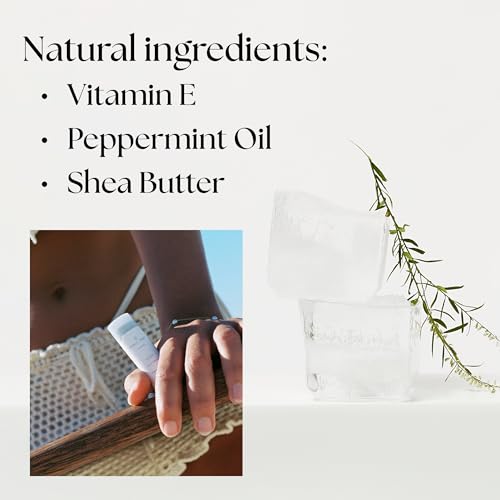
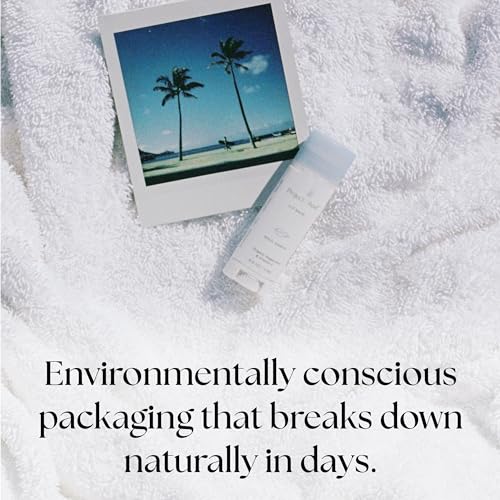
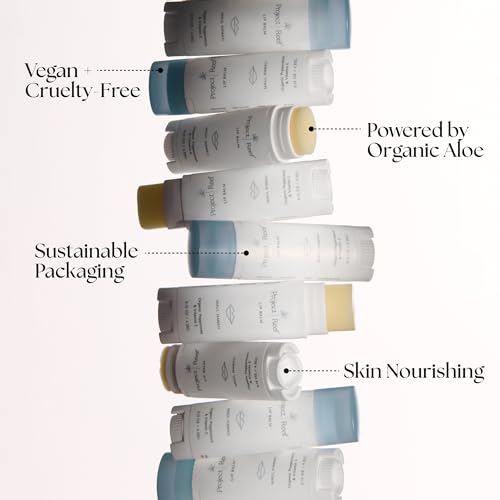
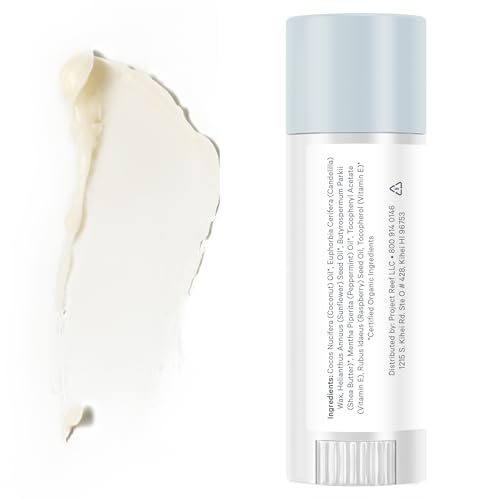
Project Reef Cooling Lip Balm - Hydrates & Soothes Dry Lips, Organic Peppermint, 3 Pack


Tocopheryl Acetate
Medium RiskTocopheryl acetate is a chemical compound that serves primarily as a form of Vitamin E. It is used in cosmetic and personal care products for its antioxidant properties and to enhance skin stability and moisture.
Sustai Insights
Tocopheryl acetate is valued for its functional benefits, including acting as an antioxidant and skin conditioning agent. It is generally considered to have low carcinogenicity and reproductive toxicity risk, although it poses a moderate concern for allergies. Environmental risks are minimal, with no significant pollutant or bioaccumulation potential noted. Regulatory bodies have not imposed significant restrictions. Safe usage practices should be followed, particularly regarding enhanced skin absorption. Alternatives like natural Vitamin E may provide similar benefits with potentially lower allergenic properties. Overall, this ingredient presents a medium risk assessment.
Helianthus Annuus (Sunflower) Seed
Low RiskHelianthus annuus (sunflower) seed is derived from the seeds of the sunflower plant and is commonly used in various cosmetic and personal care products. It serves primarily as an emollient and skin conditioning agent, providing moisture and enhancing the texture of formulations.
Sustai Insights
Helianthus annuus (sunflower) seed offers functional benefits, including skin conditioning and moisturizing properties, while being sustainably sourced and biodegradable. Health risks are minimal, with low concerns for carcinogenicity, allergies, and reproductive toxicity. Environmentally, it presents low risks of pollution or bioaccumulation. Regulatory assessments indicate no current restrictions. Overall, it is considered a low-risk ingredient, and safe usage practices should be maintained. Alternative ingredients may include other plant-based oils, but the sunflower seed oil remains a viable option.
Euphorbia Cerifera (Candelilla) Wax
Low RiskCandelilla wax is extracted from Euphorbia cerifera, a shrub native to northern Mexico and the southwestern United States. It is primarily used as a thickening agent, emollient, and film-forming agent in cosmetic and personal care products.
Sustai Insights
Candelilla wax serves effectively as a natural thickener and emollient, contributing to product texture and moisture retention. It is biodegradable and sourced sustainably, supporting eco-friendly formulations. Health risks are low, with minimal concerns about sensitization. Environmental hazards are also low, with no significant pollutant or bioaccumulation potential noted. Regulatory bodies impose few restrictions, indicating overall low risk. Safe usage practices should be followed, and alternatives like carnauba wax may be considered for those seeking different plant-based options.
Cocos Nucifera (Coconut) Oil
Low RiskCocos Nucifera (Coconut) Oil is derived from the kernels of the coconut palm. It is primarily used in cosmetic formulations for its emollient and moisturizing properties, making it suitable for skin and hair care products.
Sustai Insights
Coconut oil serves as an effective moisturizer and emollient, promoting skin hydration and softness. It is sustainably sourced and biodegradable. Health risks are minimal, with low concerns regarding carcinogenicity, allergens, and reproductive toxicity. Environmental impact is also low, as it does not contribute significantly to pollution or bioaccumulation. Regulatory bodies have not issued restrictions on its use. Overall, coconut oil presents a low risk for health and environmental concerns, making it a safe ingredient in cosmetic products.
Mentha Piperita (Peppermint) Oil Extract
Low RiskMentha piperita (peppermint) oil extract is derived from the peppermint plant and is commonly used in various products for its aromatic and flavoring properties. It serves multiple functions, including acting as a fragrance agent and providing a cooling sensation in topical applications.
Sustai Insights
Mentha piperita oil offers functional benefits such as flavor enhancement and a refreshing aroma, while it is generally recognized as low risk for health concerns, including carcinogenicity and allergies. Environmentally, it does not contribute significantly to pollution or bioaccumulation. Regulatory bodies do not impose restrictions on its use. Safe usage practices include avoiding excessive exposure, particularly for sensitive individuals. Alternatives like spearmint oil may be considered, but overall, this ingredient is assessed as low risk.
Rubus Idaeus (Raspberry) Seed Oil
Low RiskRubus idaeus (raspberry) seed oil is a fixed oil extracted from the seeds of the raspberry fruit. It is primarily used in cosmetic formulations for its emollient properties, helping to moisturize and soften the skin while providing a unique fatty acid profile.
Sustai Insights
Rubus idaeus (raspberry) seed oil offers functional benefits as a moisturizer and is sustainably sourced, contributing to eco-friendly formulations. Health risks are minimal, with low concerns regarding carcinogenicity, allergenic potential, and reproductive toxicity. Environmentally, it poses low pollutant risks and is not bioaccumulative. Regulatory agencies do not impose significant restrictions. Overall, the risk level is low, making it a safe choice in cosmetic products.
Tocopherol, D Alpha
Low RiskTocopherol, specifically d-alpha tocopherol, is a naturally occurring form of Vitamin E. It is commonly used in cosmetic and personal care products primarily for its antioxidant properties, helping to protect formulations from oxidation and extend shelf life.
Sustai Insights
D-alpha tocopherol provides effective antioxidant benefits, contributing to product stability. It is sustainably sourced and generally regarded as safe, with low concerns regarding carcinogenicity, allergies, and reproductive toxicity. However, there are minor concerns about endocrine disruption. Regulatory bodies have not imposed significant restrictions, indicating low overall risk. Recommended usage practices include adhering to established safe concentration thresholds. Alternatives, such as other forms of Vitamin E or plant-based antioxidants, may also be considered.
Helianthus Annuus (Sunflower) Seed
Low RiskHelianthus annuus (sunflower) seed is derived from the seeds of the sunflower plant and is commonly used in various cosmetic and personal care products. It serves primarily as an emollient and skin conditioning agent, providing moisture and enhancing the texture of formulations.
Sustai Insights
Helianthus annuus (sunflower) seed offers functional benefits, including skin conditioning and moisturizing properties, while being sustainably sourced and biodegradable. Health risks are minimal, with low concerns for carcinogenicity, allergies, and reproductive toxicity. Environmentally, it presents low risks of pollution or bioaccumulation. Regulatory assessments indicate no current restrictions. Overall, it is considered a low-risk ingredient, and safe usage practices should be maintained. Alternative ingredients may include other plant-based oils, but the sunflower seed oil remains a viable option.
Euphorbia Cerifera (Candelilla) Wax
Low RiskCandelilla wax is extracted from Euphorbia cerifera, a shrub native to northern Mexico and the southwestern United States. It is primarily used as a thickening agent, emollient, and film-forming agent in cosmetic and personal care products.
Sustai Insights
Candelilla wax serves effectively as a natural thickener and emollient, contributing to product texture and moisture retention. It is biodegradable and sourced sustainably, supporting eco-friendly formulations. Health risks are low, with minimal concerns about sensitization. Environmental hazards are also low, with no significant pollutant or bioaccumulation potential noted. Regulatory bodies impose few restrictions, indicating overall low risk. Safe usage practices should be followed, and alternatives like carnauba wax may be considered for those seeking different plant-based options.
Tocopheryl Acetate
Medium RiskTocopheryl acetate is a chemical compound that serves primarily as a form of Vitamin E. It is used in cosmetic and personal care products for its antioxidant properties and to enhance skin stability and moisture.
Sustai Insights
Tocopheryl acetate is valued for its functional benefits, including acting as an antioxidant and skin conditioning agent. It is generally considered to have low carcinogenicity and reproductive toxicity risk, although it poses a moderate concern for allergies. Environmental risks are minimal, with no significant pollutant or bioaccumulation potential noted. Regulatory bodies have not imposed significant restrictions. Safe usage practices should be followed, particularly regarding enhanced skin absorption. Alternatives like natural Vitamin E may provide similar benefits with potentially lower allergenic properties. Overall, this ingredient presents a medium risk assessment.
Cocos Nucifera (Coconut) Oil
Low RiskCocos Nucifera (Coconut) Oil is derived from the kernels of the coconut palm. It is primarily used in cosmetic formulations for its emollient and moisturizing properties, making it suitable for skin and hair care products.
Sustai Insights
Coconut oil serves as an effective moisturizer and emollient, promoting skin hydration and softness. It is sustainably sourced and biodegradable. Health risks are minimal, with low concerns regarding carcinogenicity, allergens, and reproductive toxicity. Environmental impact is also low, as it does not contribute significantly to pollution or bioaccumulation. Regulatory bodies have not issued restrictions on its use. Overall, coconut oil presents a low risk for health and environmental concerns, making it a safe ingredient in cosmetic products.
Mentha Piperita (Peppermint) Oil Extract
Low RiskMentha piperita (peppermint) oil extract is derived from the peppermint plant and is commonly used in various products for its aromatic and flavoring properties. It serves multiple functions, including acting as a fragrance agent and providing a cooling sensation in topical applications.
Sustai Insights
Mentha piperita oil offers functional benefits such as flavor enhancement and a refreshing aroma, while it is generally recognized as low risk for health concerns, including carcinogenicity and allergies. Environmentally, it does not contribute significantly to pollution or bioaccumulation. Regulatory bodies do not impose restrictions on its use. Safe usage practices include avoiding excessive exposure, particularly for sensitive individuals. Alternatives like spearmint oil may be considered, but overall, this ingredient is assessed as low risk.
Rubus Idaeus (Raspberry) Seed Oil
Low RiskRubus idaeus (raspberry) seed oil is a fixed oil extracted from the seeds of the raspberry fruit. It is primarily used in cosmetic formulations for its emollient properties, helping to moisturize and soften the skin while providing a unique fatty acid profile.
Sustai Insights
Rubus idaeus (raspberry) seed oil offers functional benefits as a moisturizer and is sustainably sourced, contributing to eco-friendly formulations. Health risks are minimal, with low concerns regarding carcinogenicity, allergenic potential, and reproductive toxicity. Environmentally, it poses low pollutant risks and is not bioaccumulative. Regulatory agencies do not impose significant restrictions. Overall, the risk level is low, making it a safe choice in cosmetic products.
Tocopherol, D Alpha
Low RiskTocopherol, specifically d-alpha tocopherol, is a naturally occurring form of Vitamin E. It is commonly used in cosmetic and personal care products primarily for its antioxidant properties, helping to protect formulations from oxidation and extend shelf life.
Sustai Insights
D-alpha tocopherol provides effective antioxidant benefits, contributing to product stability. It is sustainably sourced and generally regarded as safe, with low concerns regarding carcinogenicity, allergies, and reproductive toxicity. However, there are minor concerns about endocrine disruption. Regulatory bodies have not imposed significant restrictions, indicating low overall risk. Recommended usage practices include adhering to established safe concentration thresholds. Alternatives, such as other forms of Vitamin E or plant-based antioxidants, may also be considered.
Experience the refreshing relief of Project Reef Cooling Lip Balm, infused with organic peppermint oil and enriched with Vitamin E and Shea Butter. Perfect for soothing dry, sunburnt lips, this vegan lip balm is your go-to for hydration and repair while caring for the planet.
- Cooling Hydration: Organic peppermint oil delivers a refreshing wave of moisture, keeping lips soothed and rejuvenated.
- Nourishing Ingredients: Enriched with Vitamin E and Shea Butter, this balm repairs and hydrates, leaving lips soft and supple.
- Natural Beauty Boost: Fresh fruit extracts nourish and enhance your lips, helping to restore dry, cracked skin.
- Eco-Friendly Packaging: Packaged in Eco Smart materials that decompose in days, supporting a healthier environment.
- Impactful Purchase: Each balm sold helps remove 1lb of plastic from oceans, contributing to cleaner waters and a better world.
Subscribe & Save with Sustai
- Best Price Guarantee: Always enjoy the lowest prices on sustainable home essentials.
- No Surprises: We’ll notify you before shipping. No hidden fees, ever.
- You’re in Charge: Change, pause, or cancel your subscription anytime with ease.
- Eco-Friendly Deliveries: Our grouped shipments mean less packaging and lower emissions.
Join us on a sustainable journey. Special offers for a limited time! Prices and promotions may change.
Recommended Products
Experience the refreshing relief of Project Reef Cooling Lip Balm, infused with organic peppermint oil and enriched with Vitamin E and Shea Butter. Perfect for soothing dry, sunburnt lips, this vegan lip balm is your go-to for hydration and repair while caring for the planet.
- Cooling Hydration: Organic peppermint oil delivers a refreshing wave of moisture, keeping lips soothed and rejuvenated.
- Nourishing Ingredients: Enriched with Vitamin E and Shea Butter, this balm repairs and hydrates, leaving lips soft and supple.
- Natural Beauty Boost: Fresh fruit extracts nourish and enhance your lips, helping to restore dry, cracked skin.
- Eco-Friendly Packaging: Packaged in Eco Smart materials that decompose in days, supporting a healthier environment.
- Impactful Purchase: Each balm sold helps remove 1lb of plastic from oceans, contributing to cleaner waters and a better world.

You can have at most 2 Sustainable Steals products in your cart
Customer Reviews
Customers’ View
Customers appreciate the refreshing and hydrating qualities of Project Reef's Herbal Peppermint Lip Balm, with many noting its soothing effect on dry, cracked lips. Commonly mentioned benefits include the smooth application and mild minty flavor, enhancing the overall user experience. The natural and nourishing ingredients, such as Vitamin E and Shea Butter, resonate well with health-conscious consumers who value clean products. Additionally, the eco-friendly packaging and the commitment to ocean conservation through plastic removal are significant draws for environmentally minded buyers. Overall, customers find this lip balm effective in moisturizing while aligning with their sustainable lifestyle choices.
AI-generated from the text of customer reviewsThis product is rated 4.9 of 5.0 stars.
It has received 23 reviews.




